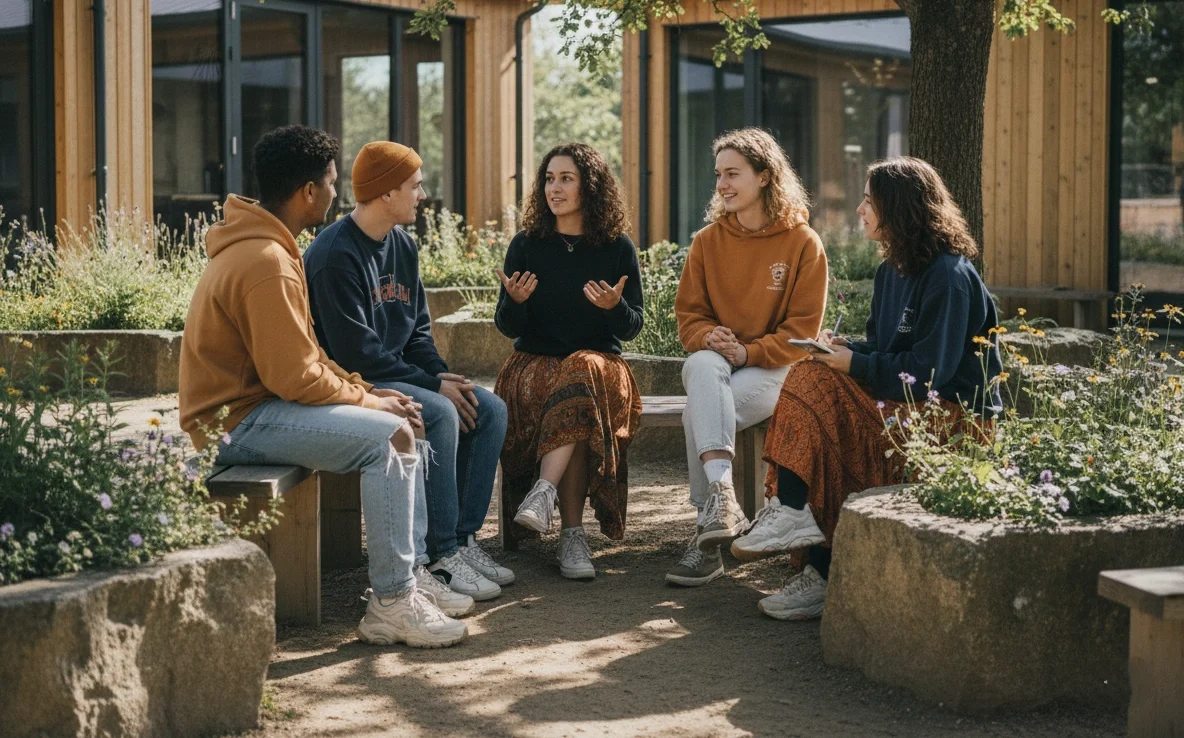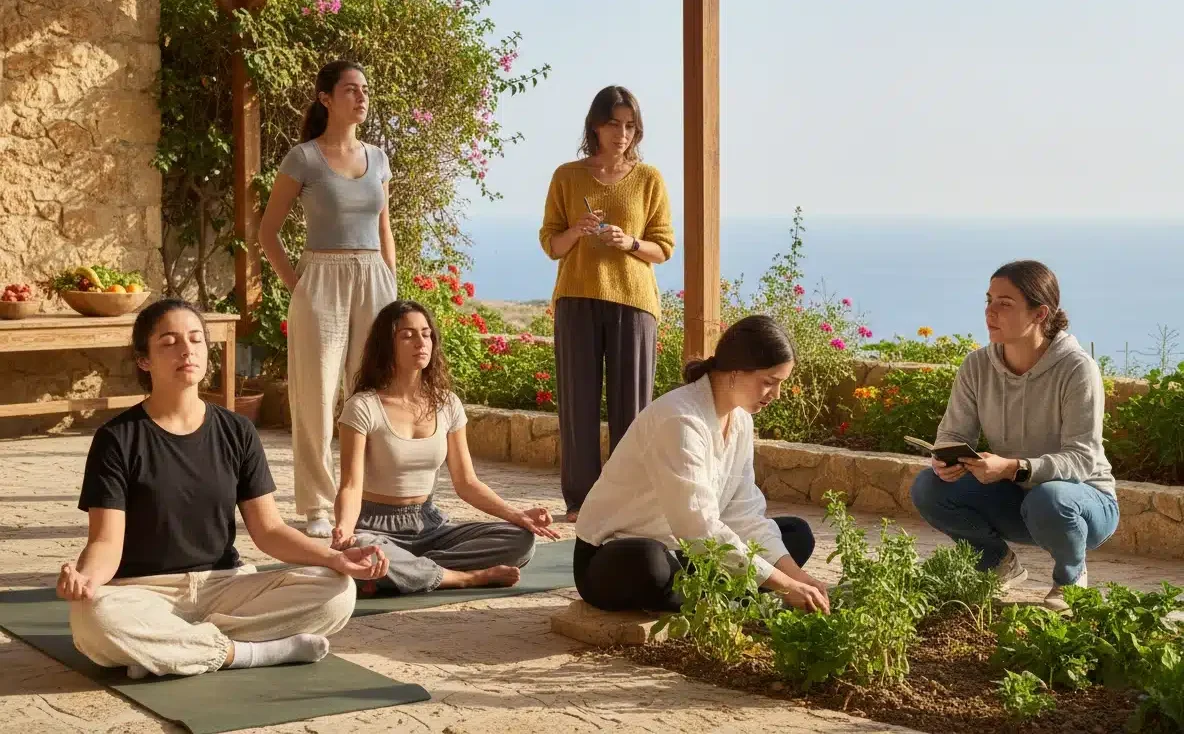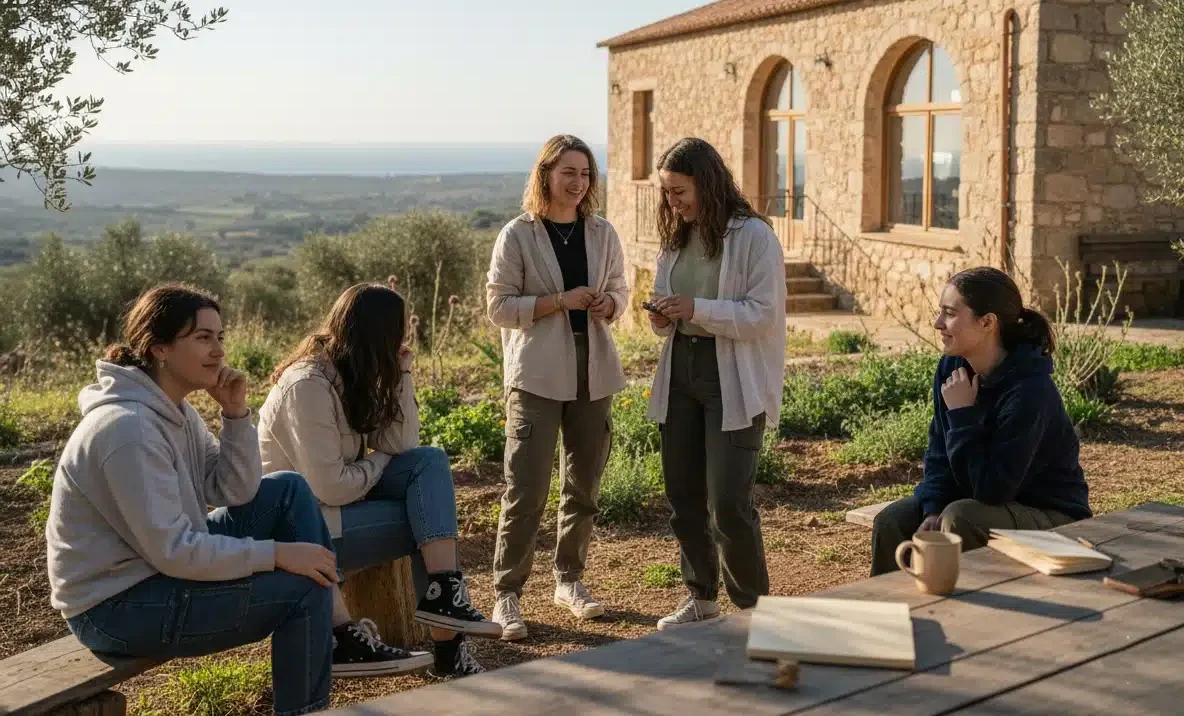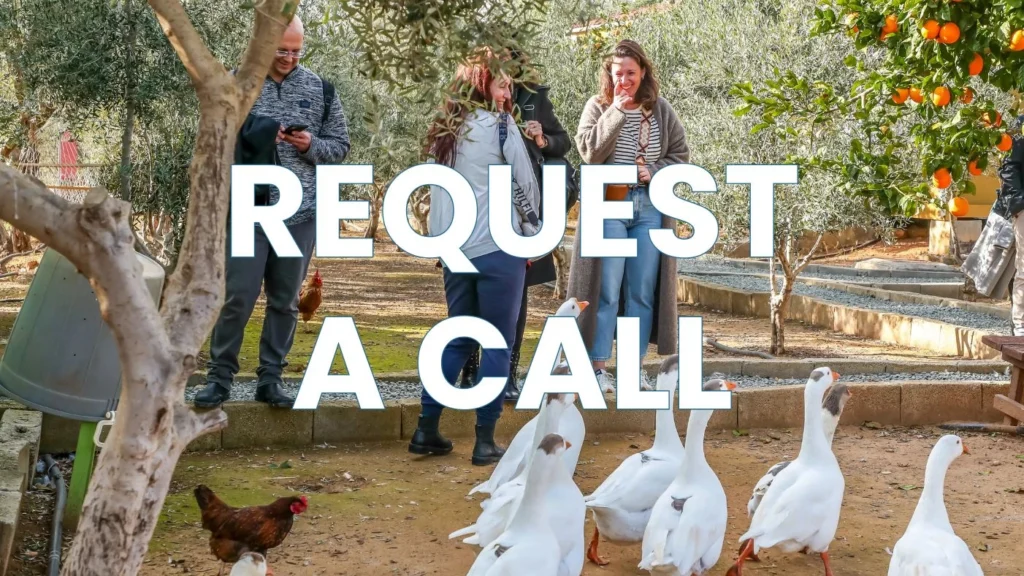Emotional Regulation for Teen Recovery: Teaching Calm in a Chaotic World
05 min read

Learning to Feel Without Falling Apart
Adolescence is a time of deep emotion — excitement, fear, anger, love, and confusion all mixed into one turbulent period of growth. For many young people, these feelings can feel too big to handle. They might lash out, shut down, or seek relief in substances, gaming, or risky behavior.
At Holina Village Cyprus, we understand that emotional overwhelm is not a sign of weakness — it’s a signal. It shows that the nervous system has reached its limit.
When young adults learn to regulate their emotions, they begin to reclaim control of their lives.
Emotional regulation is not about suppressing feelings. It’s about learning to meet them with awareness, balance, and safety — even when life feels chaotic.
What Is Emotional Regulation?
Emotional regulation is the ability to understand, manage, and respond to emotions in a healthy way. It’s a skill that develops gradually through safe relationships, consistent boundaries, and self-awareness.
For young people in recovery, this skill is crucial. Without it, emotions can become triggers for relapse, conflict, or self-sabotage. With it, emotions become guides — showing what needs care, attention, or change.
At Holina Village, we teach emotional regulation through a combination of therapeutic education, mindfulness, and experiential learning. Our students discover that emotions are not enemies to control but messages to understand.

Why Teens Struggle to Regulate Emotions
The teenage brain is still developing — especially the parts responsible for impulse control and emotional reasoning. The amygdala, which processes emotions, is highly active, while the prefrontal cortex, responsible for logic and self-regulation, is still maturing.
Add in stress, trauma, and social pressure, and it’s easy to see why emotions can feel like waves too strong to manage.
When young people don’t yet have the tools to regulate, they often turn to coping behaviors — substance use, withdrawal, or aggression — to escape discomfort.
But these behaviors don’t make the emotions go away; they make them harder to understand.
Holina’s structured, compassionate environment helps young people slow down, identify what they feel, and choose how to respond — instead of being swept away.
The Link Between Trauma and Emotional Dysregulation
Many young people who come to Holina Village carry unprocessed trauma — experiences that left them feeling unsafe, unseen, or overwhelmed. Trauma can rewire the nervous system to remain on high alert, creating emotional responses that seem exaggerated or unpredictable.
A minor disagreement can feel like rejection.
A simple boundary can feel like abandonment.
A moment of sadness can feel unbearable.
Our trauma-informed team helps students understand these reactions as protective responses, not personal flaws. Through therapy and consistent support, they learn to calm their bodies first — because regulation begins with safety, not willpower.
“When you teach a young person to calm their body, you give them back their power.”
— Therapist, Holina Village Cyprus
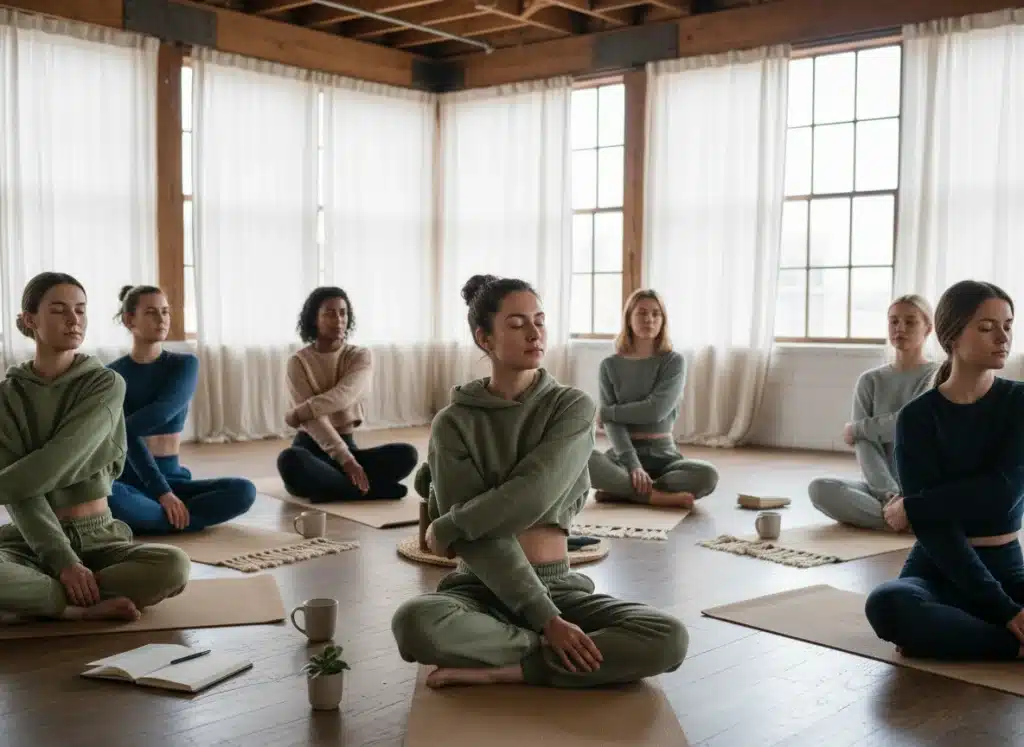
How Holina Teaches Emotional Regulation
Our approach integrates clinical therapy, daily structure, and holistic practice into a cohesive process of emotional education.
1. Therapy That Teaches Awareness
In one-on-one and group sessions, students learn to name their emotions accurately — anger, sadness, fear, shame, joy. Naming brings clarity; clarity brings choice.
2. Mindfulness and Breathwork
Daily mindfulness, grounding, and breathwork practices help students calm their nervous systems and anchor themselves in the present moment. These tools are accessible anywhere, anytime — empowering lifelong self-regulation.
3. Movement and Creative Expression
Yoga, art, and music therapy help translate emotion into movement and expression. When feelings are too big for words, creativity provides a safe outlet.
4. Routine and Predictability
Our structured daily schedule teaches consistency. Routine signals safety to the nervous system, helping students trust that each day begins and ends with stability.
5. Reflective Education
Students journal, reflect, and discuss emotional experiences with mentors. This practice transforms reactions into insights and mistakes into lessons.
The Role of Mentorship and Modeling
Young adults learn regulation best through connection. At Holina Village, every staff member models emotional awareness — from teachers to therapists to support mentors.
When a young person observes calm responses to stress or frustration, they internalize those patterns. Over time, they begin to mirror them.
We call this co-regulation — the process by which emotional stability is learned through safe relationships.
It’s how healing becomes embodied, not just understood.
Helping Parents Support Emotional Growth
Parents often ask, “How can I help my child regulate when I’m struggling too?”
The answer begins with presence, not perfection.
When parents model calm communication, honesty, and boundaries, they create emotional safety.
Holina’s family program provides coaching and guidance so that parents can learn regulation skills alongside their children. Together, they practice empathy, reflective listening, and self-care — creating a home environment that supports long-term balance.
“When I learned to pause before reacting, everything changed — for both of us.”
— Parent, UK
Emotional Literacy: Turning Feelings Into Language
A key part of regulation is emotional literacy — the ability to name and describe emotions.
When a young person says, “I’m fine,” but their body is tense and their eyes are full of sadness, we help them find the real words: “I feel scared,” or “I feel alone.”
Language transforms chaos into clarity. It builds bridges between the inner and outer world, between self and others.
At Holina Village, emotional literacy is taught daily — not in lectures, but in life. It becomes part of every conversation, every reflection, every shared meal.
How Structure Supports Emotional Stability
Structure provides safety for emotional healing. Predictable routines reduce anxiety and teach that the world can be both safe and consistent.
Our program combines therapeutic sessions with education, recreation, and community living. This balance allows emotions to arise naturally while providing the support to manage them.
In time, students learn to find calm not only in therapy rooms but in everyday life — during study, friendship, or quiet reflection.
Turning Emotional Reactivity Into Resilience
At first, emotional regulation can feel like climbing a mountain. But with practice, each step builds strength.
Holina students learn techniques to ground themselves during emotional surges: breathing, mindful observation, movement, and communication. They begin to trust that emotions pass, that they can survive intensity without self-destructing.
Resilience is not about never feeling pain; it’s about knowing how to recover from it.
The Connection Between Emotional Regulation and Academic Success
Young people who can regulate emotions are more engaged learners. They can handle stress, focus on goals, and recover from setbacks.
This is why emotional education at Holina is inseparable from academics. Our partnership with UCLan Cyprus allows us to integrate learning into emotional development.
As emotional balance improves, motivation and cognitive performance follow naturally.
Healing Through Community
Emotional regulation isn’t learned in isolation. It grows through relationships.
In the Holina community, students support each other’s growth by sharing experiences, celebrating progress, and learning empathy. Group circles and community reflections reinforce the message that it’s okay to feel — and that vulnerability is strength.
Connection transforms emotional regulation from a private challenge into a shared practice.

Long-Term Benefits of Emotional Education
Emotional regulation is more than a recovery skill — it’s a life skill.
Young people who master it experience:
Greater resilience in relationships
Improved academic and professional performance
Lower anxiety and stress
Healthier coping strategies
Increased self-esteem and confidence
It’s the foundation for lifelong emotional health — a skill that serves far beyond the walls of treatment.
Stories of Emotional Transformation
“I used to explode at everything. Now I can breathe and think before reacting.”
— Student, 18
“My daughter learned how to talk about her feelings instead of hiding them. Our home feels peaceful again.”
— Parent, Cyprus
“I finally realized that feeling angry or sad doesn’t make me weak — it makes me human.”
— Graduate, 20
Every story shows that emotional growth is possible when safety, compassion, and structure come together.
FAQs About Emotional Regulation at Holina Village
Q1: What if my child struggles with anger or shutdowns?
Our therapists specialize in helping young people understand and express emotions safely. No reaction is too much — it’s simply a place to start.
Q2: How do you teach emotional regulation to teens?
Through therapy, mindfulness, movement, education, and daily structure. Emotional learning is woven into every part of the program.
Q3: Can parents learn emotional regulation too?
Yes. Our family program includes parent workshops and coaching so families grow together.
Q4: How long does it take for improvement?
Change begins within weeks but deep regulation takes time. Progress is steady when consistency and support are present.
Q5: Does emotional regulation help prevent relapse?
Absolutely. When emotions are understood and managed, the need for escape through addictive behavior dramatically decreases.
Conclusion: Teaching Calm, Creating Strength
In a world that overwhelms young minds, emotional regulation is a lifeline — the bridge between reaction and reflection, chaos and calm.
At Holina Village Cyprus, we don’t ask young people to suppress their feelings. We teach them to understand, express, and transform them.
Through structure, therapy, mindfulness, and compassion, they learn that peace isn’t the absence of emotion — it’s the ability to stay grounded in the middle of it.
Because when young people learn to feel safely, they don’t just recover — they grow.
Begin your child’s healing journey with Holina Village Cyprus today.
Where emotional understanding becomes the foundation for lifelong strength.

